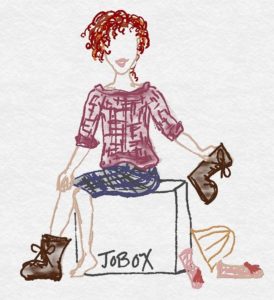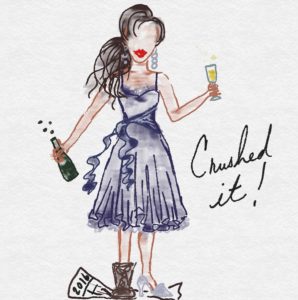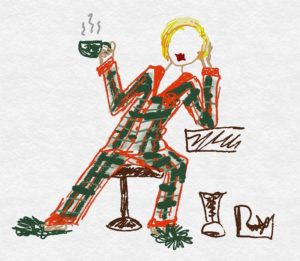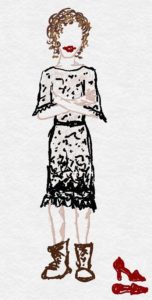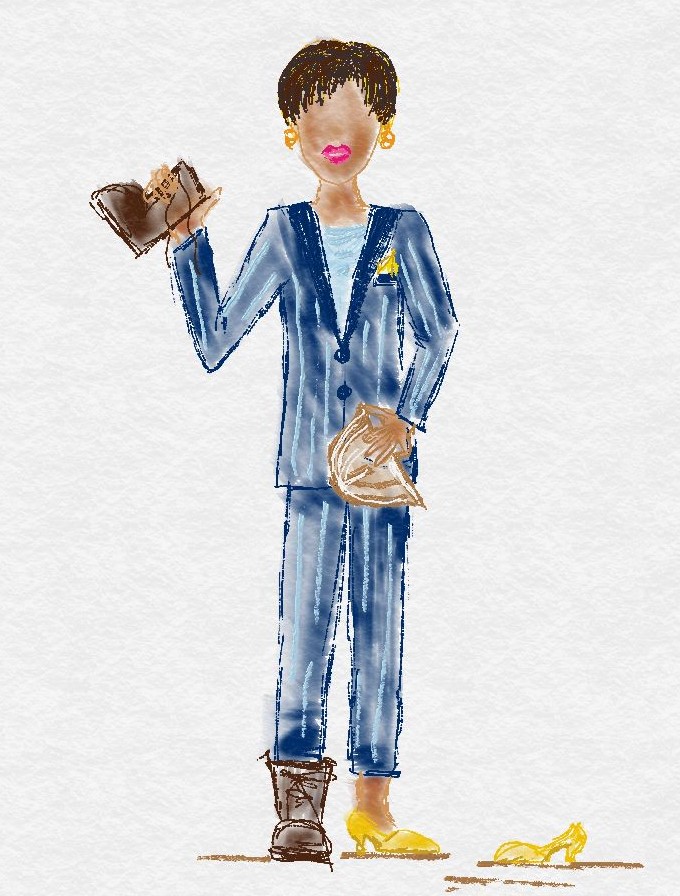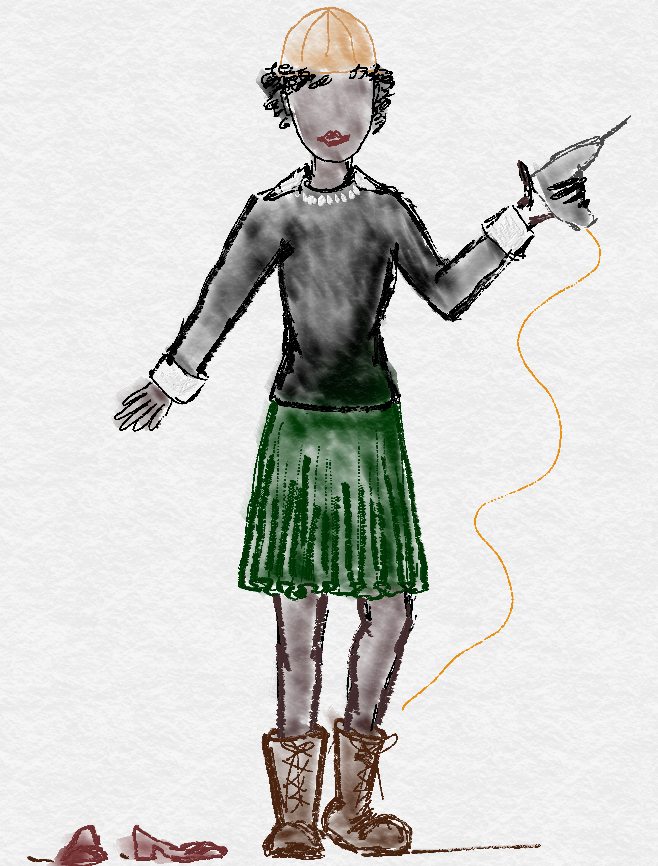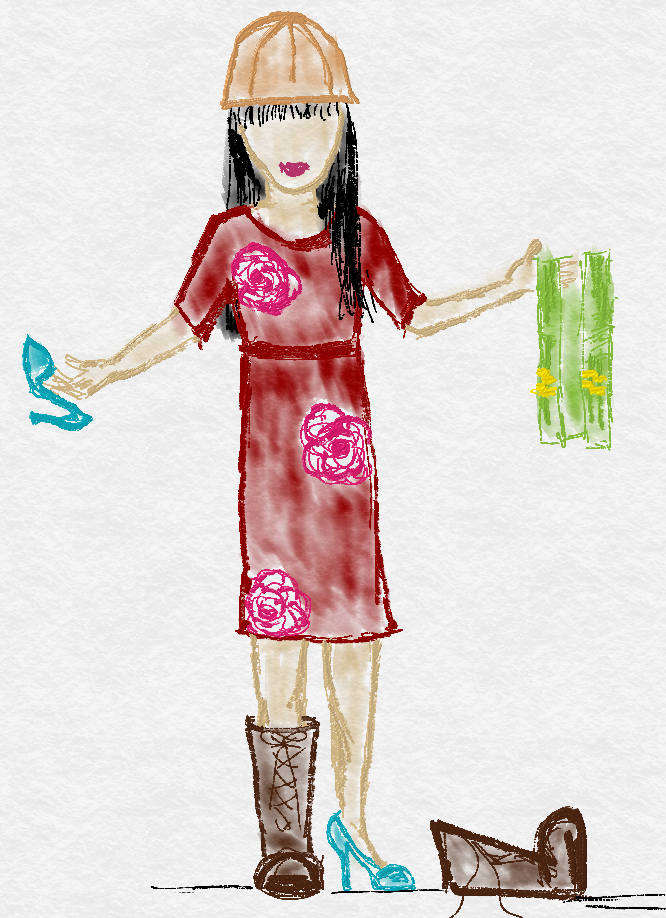Peggy Hagerty Duffy
Well Read
Booking an Adventure
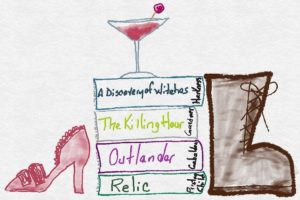
I am a nerdy fan of any type of personality test. I love evaluations like Myers-Briggs, and I’m fascinated even by scientifically unsupported associations like astrology. We all know that psychology is a soft science, and the interpretations and nuances are never-ending. Plus, I am constantly intrigued by people.
To that end, I am obsessed with behavioral patterns and likes/dislikes that define people’s personalities. If you happen to land in a discussion with me and a group of people at a cocktail party, I almost certainly will ask you, “What’s your favorite movie?” or some similar question. I love to view people through their preferences.
One of my favorite questions is, “What do you read?” You don’t even need to be stuck with me over cocktails to be presented with this query. I might bump into you on the escalator at Macy’s and ask. Why? Because I love to read, and because an individual’s reading material is a window into not just their* soul, but into their situation in life. We read for so many reasons, to fill needs that are perennial as well as immediate. When someone tells me what they read, I learn two things. I understand more about their inner workings, and I get a possible lead on good reading material.
For me, reading most often balances the very very left brain environment of my daily work day. I read almost entirely fiction, unless it’s a cookbook or a gardening book. I currently am reading The Code Book, by Simon Singh, about the history of codes and ciphers, but this is very unusual. Don’t give me a biography, a discussion about the current economic/political climate, or anything scientific. I live that all day. And if you hand me any type of self-help book, I’ll assume you don’t want to be friends.
Over the years, I have noticed a number of trends in my reading, and they all mostly serve my intellectual and emotional needs. The protagonists in my books are usually female. Typically there is some form of romance, even if it’s incidental or a very small sub-plot. Often there is some type of scientific or fantastic angle. I hate books with jaded, bitter, or otherwise fundamentally negative protagonists. There are definitely books in my rotation that some might call fluff or trash. (My dad does). And the ending MUST be at least marginally happy. If someone is going to die or the world is going to turn dystopian, keep that nonsense to yourself.
One of my absolute favorite series, and some of my all-time favorite reads, are the Outlander books by Diana Gabaldon. Do I love these because they’re dramatic and one of the main characters is a 6-foot gorgeous Scot from the 1700s? Of course – do I look stupid? But I identify with these books mainly because I think Gabaldon has created one of the truly complete female characters in recent literature. Claire Fraser – nurse, then doctor, wife, counter-revolutionary, counselor, spy, advisor, mother – has been painted with a depth and a subtle feminism that is unusual even in current fiction. She goes about her medical duties with only the knowledge that she wants to heal people. She doesn’t get bogged down in whether a woman should be doing these things, even when others around her do, and she doesn’t make a crusade of it. Her character embraces adventure and doesn’t get whiny when she is uncomfortable. She is not afraid to show emotion, and she doesn’t feel diminished by the fact that she loves her husband so much that she willingly dramatically alters her life for him. She isn’t afraid to express her opinions, even when it makes a situation uncomfortable, but she is sensitive to the constraints and cultural limitations of people around her. I truly feel reinforced when I read these books because the heroine controls her own destiny.
Some books have proven to illustrate the perceptions of women in certain roles in our society, and I have read these as information on the thinking of people I deal with every day. Sara Paretsky, author of the V.I. Warshawski books, wrote into one of her novels a scene in which Warshawski, the private detective heroine, wanted to go unnoticed so she donned a hard hat and a clip board. I laughed for 20 minutes and then e-mailed the author and assured her the easiest way for a woman to be noticed is to wear a hard hat and carry a clip board. She actually responded and said she was surprised, but that just goes to show what the average person doesn’t know about being a woman in a field populated primarily by men. Amen, sister.
My search for new and interesting books that help me to fill in all those divots and blank spots in my life, for books that inspire me and those that give me hope, will not end until I can no longer read. I should mention that I also read piles of magazines, blogs, and a variety of other on-line publications. Thoughts and words are seeds that grow into beautiful and interesting actions and emotions. All of these sources help me to navigate the path that I’m following, and I know I am not alone in this practice.
So, here we are in this burgeoning online community of smart women and men who are the Underpinnings cocktail party. Before I go to refresh my pomegranate martini, you know what my inevitable question will be. What do you read?
(Author’s Note: Helen has assured me that the use of the singular “they” is now acceptable in mainstream publications and using he/she is awkward and passé. I feel very certain that Sister Mary Prisca Pfeffer would not agree and will rise from her grave and smite me. My death will be on Helen’s head).
Bought and Paid For
How Do We Ignore the Voices That Say We’re Not Enough?
A couple of weeks before Christmas, I was watching TV and a trailer for the movie “Hidden Figures” came on. A man in the movie asked Janelle Monae if she would want to try to become an engineer if she were a man, and she said, “No, because I would already be one.” And I cried.
The next week, I was in Barnes and Noble buying a book for my niece, and I happened upon the book, “Isabella, Girl in Charge,” which uses plays on words to introduce influential women in political history. I got to the last page, where the daddy has Isabella on his shoulders as a woman is being inaugurated President of the United States, and I cried.
As I was fleeing the curious stares in the bookstore, I was mentally yelling at myself, “What is the matter with you?” Don’t get me wrong – I am a board certified crier. If you yell at me on a jobsite or try to start a fight in a meeting, I won’t shed a tear. But if two people fall in love during a 15-second coffee commercial, or my football team wins, or there’s a ribbon cutting at the car wash down the street, I’m a torrential downpour worthy of a Weather Channel official name. I’m an empathetic weeper, more likely to cry with joy than with sadness, so tears are not unusual for me on an average Monday.
It took me several days of evaluation akin to a good wall failure analysis to figure out what was going on. I know that I cry at movies, but my reaction to the trailer was a bit much, even for me. And I was disappointed in the election results, (even though I don’t agree with all of Secretary Clinton’s policies), but there was something else there, something that reached beyond my distaste for President-Elect Trump’s attitude toward women.
I have to admit, I was shocked and well, to be honest, embarrassed when I finally realized that my emotional reaction really was a latent condition that was triggered by the election. It made me realize that I bought it. Bought what? The idea that women are ever so subtly just not as good as men in certain areas. Somewhere, deep in the recesses of my psyche, some little piece of me actually has believed the pervasive social perception that women are less in some parts of life. To be the star engineer, to be president – if it happened it was a fluke because we aren’t really equipped to do that. I’m not really equipped to do that.
How could this be? I’m still amazed. My feelings certainly had nothing to do with the way I was raised. My parents NEVER differentiated between their two boys and two girls. They asked us, “What do you want to do? What do you want to be?” They drove me to Little League baseball practice, not because they were on a feminist crusade, but because my brothers played and I said I wanted to, too. I told them I wanted to be good enough to play professionally when I grew up, and they said, “Great! Work hard.” (Thank goodness I quickly discovered that I hate baseball and that football is life). I could have said I wanted to grow up to be the foreman on an offshore oil rig and they would have sat down with me and come up with a plan involving a good education and a lot of hard work.
I have been fortunate enough to be surrounded by supportive and equality-minded friends and family my whole life. And I can’t think of anyone who has met me for more than 3.6 seconds who would classify me as a pushover or a doormat. So how did this happen?
Stepping outside my head a bit, it occurred to me that apparently the fabulous friends and family didn’t create enough of a wall to keep the chatter from the rest of the world out. I went through school only one year after my wonderful, brilliant older brother. No matter what I did, no matter what great test scores I got, someone always was around to mention, “Yeah, but her brother did way better.” In high school, my school didn’t have calculus*, so three of us lobbied to drive over to the nearby boys’ school during lunch to get to take calculus there. We didn’t get the arrangements made until the first week of the school year, so we couldn’t take the top class, which was a college credit class. But we enrolled in the advanced calculus class, and we got the top three test scores for the first four tests of the year. Several of the teachers commented, “They got the best scores, but it’s because they’re not in the top class.” And in college, I heard repeatedly that girls do well in engineering school only because they study more. It didn’t help that I didn’t particularly like math, and English was my favorite subject. This only reinforced the stereotype that I wasn’t really meant to be there.
Even in my professional career, where I own my own business and I’ve worked through some brutal conditions on remote jobsites, I have listened to snide little remarks about how I got things done because I got along with the guys, not because I was technically competent or because I had good management skills. And there has been no shortage of well-meaning people who didn’t realize how condescending it is to act like it’s “cute” that a little woman is ordering guys around on a construction site.
I suppose the constant outside influences somehow penetrated my rock-headed Irish consciousness over the years. And for that I am embarrassed, and disappointed, and angry. I think the possibility of a woman becoming President somehow was a subconscious trigger for me, a sign that maybe all of those people were wrong. We say all the time that anyone can be anything in the United States, but I think that a woman becoming President would make a nice concept a reality. And somehow it would validate the theory that women are just as capable as men of doing anything – math, science, world domination. And it would validate that who I’ve been all these years is not a façade over an inadequate structure.
Of course I’m crying as I type this, and I hope that little girls everywhere share no inkling of the insecurity I apparently have felt for many years. I hope that we have a woman in the White House in the near future, not because we need to prove anything, but because we can. In the meantime, I’m going to concentrate on exorcising this demon of doubt from my soul. I’m not happy that the election turned out the way it did, but I’m glad that the trauma of it wrenched free a problem I didn’t even know I had. Who knows? Maybe that woman President will be me.
*Note: Mercy Academy in Louisville, Kentucky, has more than made up for lost time, becoming the first all-girls high school in the U.S. to have a STEM-accredited program. Mercy also launched an award winning ad campaign several years ago that centered around the theme “You’re Not a Princess.” Go Jaguars!
Happy New Year
Happy Holidays – Whatever That Means to You
Merry/Happy Something
It’s the end of December, and avoiding a holiday of some sort would be a difficult task. This is the time of year that emotions and social activity seem to hit a crescendo, sounding a tone that provides a soundtrack for our lives for at least a few weeks, if not more.
As the activities increase, often so do the responsibilities…and the expectations…and the preconceptions…and the guilt. We want to make sparkly shiny holidays to remember for our families, and we try either to overdevelop or hide these Martha Stewart-esque tendencies as we go about our professional lives. We entertain fantasies of moments under the mistletoe based on Hallmark Channel movies, (you can admit it – this is a safe space), while trying to maintain a tough, no-nonsense attitude on the jobsite. And we make donations to the Charleston Animal Protection Society by buying their annual Firefighter Calendar (FIREFIGHTERS WITH PUPPIES) while trying to pretend we’re really excited by the annual ASCE Bridges calendar (okay, maybe you are, but FIREFIGHTERS WITH PUPPIES).
The holidays don’t change the issues we deal with the rest of the year. We’re multi-faceted, interesting women who can’t be pigeonholed. The only way we can reinforce that idea is to share with each other all of our stories and special moments to affirm their importance.
We wish you a fabulous Christmas/Hanukkah/Kwanzaa/Winter Solstice/After-Christmas Shoe Sales, or whatever you’re celebrating. Good luck making a papier mache lobster head, or baking 4,000 cookies, or finding the perfect gift, or even getting your hands on a signed copy of the ASCE Bridges calendar. Let us know what fabulous things you’re doing – here are our versions:
Helen- Christmas is a Checkbox
Right now a lot of things in my life are a blur and get finished “just in time” or are deemed noncritical and shuffled to another list. If possible, this kicks into an even higher gear during the holidays. Christmas has always been one of my favorite times of the year, and was one of the reasons I wanted to have my wedding in late December. Now it is more than a little emotional since I got divorced last year.
At this time in my life I am in Mama Bear/Warrior Woman Mode, or MBWWM for short. I typically sleep 4-5 hours a night and then charge about the rest of the time from one thing to another, juggling two demanding part-time jobs, involvement in professional societies, three young children, multiple sports and activities for the older two kids, one Brownie troop, and a partridge in a pear tree. The days are long but the years are short, as they say. My life exists in lists: grocery (of course); long-term professional endeavors such as technical paper topics; what is due this week in school: homework, quizzes, pretzel money, basketball sign-ups, contribution to a class party, or the book fair; clients to reach out to for business development; and what we are planning for the next scout meeting, outing, or camping trip.
There are also the worries: are my kids eating healthy enough, brushing their teeth sufficiently, getting enough exercise, doing okay with the divorce, making the right friends, learning enough in school? Is it time to go through their clothes and sort things that don’t fit, give some toys away to charity or to younger cousins, or potty train the youngest? Am I progressing quickly enough in my professional career, is the specification I wrote sufficient for that project, will the contractor change the schedule yet again, and am I getting exposure inside my company and beyond it? These worries don’t stop because of the holidays- if anything they intensify for me.
I am not just playing Negative Nancy to Peggy’s Suzie Sunshine. The “before-children me” avidly followed Penn State football and Phillies baseball, loved having dinner parties and making breads and desserts, read books from numerous genres voraciously, loved hiking with my dogs on the weekends, binge-watched Buffy the Vampire Slayer, ER, and the X-files, and made plans to have drinks with friends bi-weekly. But right now I am the “single-mom with young children me” and much of that has been pushed aside while I have fully taken on this role.
But I am very fortunate to have met women through professional societies who report that there is a light at the end of the tunnel. Their children are grown and they are free to travel, work more, play hard, and rediscover themselves. An overwhelming majority of them are divorced as well, which I thought was interesting enough to point out, but I won’t speculate on this point today.
So, if all that is part of my “normal” life, what does it mean for the holidays? Aside from more lists: addresses for Christmas cards and gifts for the bus driver, teachers, the kids’ nanny, etc., it means instilling hope, love, and thankfulness in my children. I carry on the traditions of lighting an advent wreath at family dinner, cutting down our own Christmas tree, going to Christmas Eve mass, and leaving cookies and milk out for Santa. We have new traditions including making gingerbread houses, seeing a festive movie with the scouts, and doing good deeds with the help of our Kindness Elf (not Elf on the Shelf!). It also means stopping to appreciate the wonder that a 7, 5, and 2 year old experience on Christmas morning and expressing the gratitude that I feel toward my family and friends, and especially my parents, for the support they give me. Then I’ll cross Christmas off the list and move on to the next thing!
Peggy- It’s a Wonderful Life!
I grew up in a very close, Irish Catholic family, and we had more Christmas traditions than I could describe. In addition, I am a hopeless romantic, and the sparkly happiness of the holidays feeds right into my rather ridiculous love of all things sappy and festive.
Every year I hear and read endless comments/articles/doctoral theses about how difficult the holidays are and how tragic it is that everything is so commercial. But I tend to take the opposite stance. I love the holidays because there is more optimism, more kindness, more love than during the rest of the year. A pessimist would say it’s sad that people can’t be as kind and generous as they are during the holidays. I say isn’t it wonderful that people are better versions of themselves for part of the year? Doubters decry the commercialism of Christmas; I am happy that the holiday gives a number of people money to feed their families, and the constant commercials make some people take a moment to reach out to loved ones when they normally would not. Yes, I am Suzie Sunshine, and I’m not sorry. The guys on my construction sites get homemade cookies from me, and they’re not sorry either.
Many of my favorite things are holiday-related, because the season seems to act as an amplifier for emotions and reactions. My favorite date scene in a movie is the shopping/dinner date in the 1994 version of “Miracle on 34th Street.” My favorite dance scene in a movie is the Vera Ellen/Danny Kaye number at the club in Florida in “White Christmas.” My favorite shopping day of the year is my annual day at the mall in December with my mom and my little brother. And although it’s not my absolute favorite food, I absolutely love spending 5 or 6 hours making fruitcake in mid-November from my grandmother’s recipe and soaking the 12-pound cake in bourbon every week so the family can enjoy a little bit of family history at Christmas dinner.
It amazes me when clients ask for last minute drilling the week before Christmas, but I’m much less angry than I am when confronted with unreasonable requests the rest of the year. And sexist remarks have much less sting when Harry Connick Jr. is singing about Christmas Dreaming in the background. The happier I am, the stronger I am to take on those who don’t believe in me.
Even if you don’t live in my little glitter-filled, sugarplum-encrusted world, I hope you can find a way to experience some joy in the holidays (FIREFIGHTERS WITH PUPPIES). Every little bit of happiness makes you stronger, and there’s a lot of stray bliss lying around during the season.
United We Rock
Weaving Bonds That Don’t Break
Family vacations in my childhood were spent in many different locations. The agendas were varied, the adventures were comical, (including the Exploding Station Wagon Incident of ’78), and the sibling bickering was typical. But the one constant among all the excursions was the inclusion of a visit to a historic site somewhere along the way. Civil war battlefields, aircraft carriers, forts, and so very many cannons – we saw it all.
This thread of military history also invaded our family dinners, our discussions on long car rides, and our family movie nights. I swear the soundtrack of my childhood has the low drone of a B1 bomber somewhere in the background.
Every member of my family loved these stories and artifacts of past conflicts…except me. I longed for a visit to whatever mall we were near or an overnight backpacking trip in the local state park. Mostly what I took away from the endless parade of war movies was that they wore great clothes in the 1940s, and the men who fight in wars are really, really young.
However, one fact did embed itself in my brain despite my aversion to all things war. My dad spent an evening explaining the Battle of Culloden to me one night after I mentioned all the really gorgeous plaids in Great Britain. He explained that the Scottish clans weren’t allowed to wear their clan plaids after they were defeated at Culloden. The British cemented their victory by removing the clans’ pride and identities. He also said that one of the main reasons the Scots lost the battle, in addition to being outnumbered and underequipped, was that they spent so much time fighting with each other that they did not present a united front against the British. They beat themselves by putting their individual clan goals above the goals of the country.
That problem from almost 300 years ago is something I observe today as women continue to struggle for equality. We repeatedly state that we must work together, we must unite. But unity is hard. And I believe this is one area where we need to look to ourselves to fix some of the problems that undermine our success.
As women, we have a tendency to be defensive about what we do to the detriment of women in other life roles. Professional women, particularly those of us in male-dominated fields, will scoff at women in “fluffy” positions like actresses and models. We don’t admit it, but we all have made some sort of comment about full-time moms, something along the lines of, “Wouldn’t it be great to only have to worry about taking care of the house and the kids?” And we pity women in unskilled positions – waitresses, retail salespeople – without having any idea of the quality of their lives and without valuing their contributions to society. The women in those categories make similar comments about professional women: “Oh, good for her that she has her career, but she doesn’t have much of a family life, does she?”
We actually have no right to stereotype, pigeonhole, or downplay the lives of women in other roles. Are they happy? Are we? Don’t we need all sorts of people in all sorts of roles to have a well-developed society? But women have spent so many centuries fighting for the few tiny crumbs available that would allow them control over their own lives that we view each other as adversaries. Instead of saying, “Good for her. She has made millions of dollars contributing to the arts and entertaining people as an actress, and now she can feed her family and send her kids to college,” we say, “Yeah, must be nice to just wear a bunch of gorgeous clothes and act in a movie and give interviews and make all that money.” Instead of saying, “I’m so glad she is able to make the most of her abilities and care for her family to the fullest extent possible,” we say, “Can you believe she gets to watch daytime TV and go to the grocery before 5:00?”
The bottom line is that no life path is better or more worthy than another. We should be taken seriously no matter what we choose to do. Unfortunately, history has dictated that women have not had a choice in the past. Now that we (mostly) do, we are insecure and self-conscious about the choices we make. We express that insecurity by denigrating those who didn’t choose our path.
In order to reinforce the worth of our choices, we have to support each other. I don’t mean we have to support each other as women in male-dominated fields. I mean we have to support all women. Every path is valid or none are.
The ladies in Hollywood have the right idea. Reese Witherspoon just started a production company intended to celebrate the triumphs and issues of women. Instead of saying, “Ugh, of course, she has the money to,” how about if we use that momentum? No, we don’t agree with unrealistic body types and some of the other unhealthy perceptions perpetuated by the media. But we are 51% of the population. If we take control of the conversation, and say, “Good for her – she commanded a big salary. Wow, I’m impressed – she’s getting people to read by starting a book club. Way to go – she had the initiative to start her own fashion line using regional textiles and labor,” we could shift the emphasis away from the freakish body types and onto the accomplishments of these high profile women. And if we refocus the spotlight onto these achievements, the light will shine on lots of other women in a wide spectrum of efforts.
The bottom line is that we need to stop whining. To be in charge, we need to stop talking about what should be done or complaining about what we don’t have and start trumpeting what we have and who we are. We need to celebrate our sisters.
The biggest challenge to this task will be to have disagreements without splintering apart like the Scots did. We must be able to argue and hash things out and hear differing opinions. Our country just experienced a big upheaval, and the most pronounced side effect has been the mean, ugly bitterness between friends and family. This is the way of failure. Just like if a family has to make a decision about sending mom to a nursing home, there will be differing opinions, and emotions will run high. But everyone has the same goal; mom’s best interests. Similarly, we all want women to move forward to an equal place in society. We need to weave bonds that can’t be broken as we shape ourselves into something new.
Learning My Way
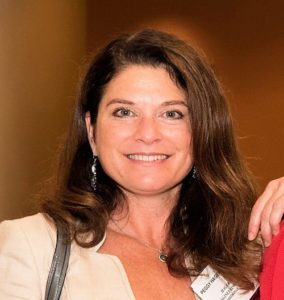
My Way or ….Well, There Are a Lot of Really Great Roads
For those of us in the foundation industry, there is no shortage of advice on how to be a woman in a male-dominated field in 2016. (Truly, there is no shortage of advice on how to be any type of woman in 2016). We have “experts” explaining to us the psychology of business and how male-female relationships fit into that world. We also have lots and lots of women and men giving us detailed and confident guidance, even though they never have experienced what it’s like to be a woman in a man’s world, and the situation is only a theoretical problem on paper to them. So how do we navigate these waters? Is there a template we can follow? Basic rules of thumb? Perhaps an adult coloring book with situationally appropriate responses and behaviors clearly illustrated in line drawings?
I spent my second co-op semester with an internationally-respected environmental engineering firm. Approximately one hour into the first day, one of the engineers introduced herself to me and told me that she intended to take me under her wing and make sure that I enjoyed an internship that would be beneficial to my long-term career. Approximately 90 minutes into the first day, she informed me that the most important action I could take to set the tone for my tenure with the firm would be to tell the guys in the office that they wouldn’t be (blank)ing me, even though they wanted to. Excuse me? I was 19. My very polite, very southern, very Catholic world to date did not include any such in-your-face communication with, well, anyone. In addition, the logical, engineer-like part of my brain kept whispering, “How do you know they want to? What if they don’t like flat-chested brunettes with oddly green eyes?”
This engineer subsequently dragged me to jobsites, meetings, and conferences, all the while urging me to hit every guy with a full-court press of aggressive animosity. We crawled in sewers with municipal crews and drank beer with them at lunch (!), then she berated me for not biting their heads off when they offered to carry our equipment to our truck. She told off a sweet older man who told us he was proud to be working with “two gals.” She stood on a construction site and gestured to her private parts, telling the guys, “I know this is what you want, but you’re not getting it.” She told me every day that I needed to toughen up and follow her example.
I was confused and miserable. I wasn’t a shrinking violet, and I have never had trouble speaking my mind. But this just wasn’t how I was comfortable dealing with people. In my mind, others should be treated with respect until they demonstrate that it’s not warranted. I like people; most people, in fact. This engineer’s approach assumed that every man in my professional world was an adversary. And she beat me up with the idea that I would only succeed as an engineer, particularly in the construction world, if I followed her lead.
With no one to consult and no role model to observe, I had to make a decision. I could take her advice and act in a way that was completely in conflict with my personality, or I could forge my own route and risk sabotaging my career if she was right.
My rock-headed, leap-before-I-look personal drive eventually won out. If she was correct and the engineering world was going to be so contentious, I didn’t want any part of it anyway. I knew I didn’t want to exist inside a cubicle, so whatever I decided had to take into account the potentially rough and tumble world on construction sites. I decided I would take my chances and deal with it in my own fashion. She was furious and told me I was undermining women as a whole. I told her that her hateful approach might actually threaten continuation of the human race. We never spoke again. (My boss later told me they knew what she was doing but they trusted me to “figure it out.” Ugh).
I plowed ahead over the years, confronting everything from subtle sexism in meetings to physical assault in a locked construction trailer. I made a lot of mistakes. But I never felt like I wasn’t being myself.
Several months ago I heard a woman in a meeting say that she was uncomfortable at her firm because she was the only woman on her floor at the office. I waited to hear about harassment or shunning, but her solo existence was the whole of her story. My first reaction was to scoff. “Are you kidding me? No one has touched you or ignored your work or made snide comments about you and you’re uncomfortable? Seriously?!” But I realized a short time later that she, like me, has her own criteria for what makes a situation tolerable and how she handles it. Mentally I apologized, even though she never knew of my negative reaction. I’ll support her if she ever needs help figuring out how to move to a firm with more women or encourage her present firm to recruit more women. Whatever works for her.
We all need to figure out how to navigate our male-dominated paths in a vehicle of our choice. There is no blueprint, no specifications, no ASTM standard for how to behave, to react, to assimilate. We all have different resistance factors, (sorry – you knew there would have to be a geotechnical reference in here SOMEWHERE), and the minefields we’re navigating are landscapes unique to each of us. The best we can do is look around to find other women who are like us, and observe how they act. I have one friend who has a personality similar to mine, and I consult her often when I run into a testosterone wall. Another of my friends is much less tolerant than I am of human foibles, and I rarely look to her as an example or for guidance. I love and respect her, but her way isn’t my way.
As sparse little pink dots in the dirty (literally), rough sea of blue that is the foundation construction world, we have to maintain our connectivity to reinforce our presence. The more opinions and experiences that we exchange, the better chance we have that every woman will find someone else’s voice that resonates with her. And the more sounding boards we all have, the less chance there is that some of us will give up this wild, wonderful adventure.
How We Got Started
Once Upon a Time…
…there were two little girls who weren’t afraid to get dirty. Peggy and Helen made mud pies and ran through creeks and blazed new trails through the scariest of vacant lots. As they grew up, they figured out they could make things in the dirt they loved so much. Tiny forts turned into fishing docks and party decks. The little girls wanted more, so they went to engineering school to learn how to turn their simple magic into true construction voodoo.
Most mud has worms, and the girls’ adventure opened a can of them. The worms weren’t squishy or slimy, but rather sneaky and tricky. For every marvelous discovery in how to make things stand up in the mud, someone appeared who told Peggy and Helen that good girls don’t play in the dirt. For every victory in building something to help people cross over really soft mud, a nasty boy appeared to tell the girls that mud-covered girls were sexy but not smart. And for every giant dam the girls constructed to make a lake for their neighbors to swim in, someone appeared to explain to them that girls don’t know how to do that.
Peggy and Helen were mad and frustrated, but they weren’t about to stop playing in the mud. They knew there were other girls out there who were getting dirty on purpose, and they just had to find them. If they all talked about how to handle the worms, maybe they could figure out a plan. And maybe they could just go on being who they wanted to be.
So the girls wrote a note on a piece of paper and made it into a kite. They flew the kite high and wide, and every time they reeled it back in, another girl had added to the note. Pretty soon, the kite was covered with all sorts of opinions on how all sorts of girls could handle worms in their own ways. Peggy and Helen read the notes, flew the kite, and figured out how to get rid of worms so they could go back to playing in the mud. Girls everywhere read the notes, and most of the worms got put back in the can. And life was as it should be – dirty and happy.
